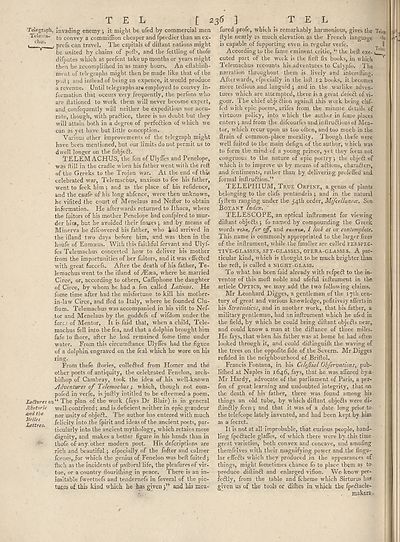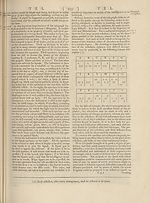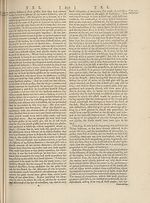Encyclopaedia Britannica, or, a Dictionary of arts, sciences, and miscellaneous literature : enlarged and improved. Illustrated with nearly six hundred engravings > Volume 20, SUI-ZYM
(270) Page 236
Download files
Complete book:
Individual page:
Thumbnail gallery: Grid view | List view

TEL f 236 ] TEL
•Telegraph, invading enemy j it might be ufed by commercial men
Tchu a~ to convey a commiflion cheaper and fpeedier than an ex-
. C . prefs can travel. The capitals of diftant nations might
be united by chains of pofh, and the fettling of tbofe
difputes which at prefent take up months or years might
then be accomplifhed in as many hours. An eftabliih-
nient of telegraphs might then be made like that of the
pod ; and indead of being an expence, it would produce
a revenue. Until telegraphs ar« employed to convey in¬
formation that occurs very frequently, the perfons who
are ftationed to work them will never become expert,
and confequently will neither be expeditious nor accu¬
rate, though, with pradlice, there is no doubt but they
will attain both in a degree of perfedlion of which we
can as yet have but little conception.
Various other improvements of the telegraph might
have been mentioned, but our limits do not permit us to
dwell longer on the fubjeft.
TELEMACHUS, the fon of Ulyffes and Penelope,
was dill in the cradle when his father went with the reft
of the Greeks to the Trojan war. At the end of this
celebrated war, Telemachus, anxious to fee his father,
went to feek him; and as the place of his refidence,
and the caufe of his long abfence, were then unknown,
he vifited the court of Menelaus and Neftor to obtain
information. He afterwards returned to Ithaca, where
the fuitors of his mother Penelope had confpired to mur¬
der him, but he avoided their fnai'es; and by means of
Minerva he difcovered his father, who bad arrived in
the ifland two days before him, and was then in the
houfe of Eumgeus. With this faithful fervant and Ulyf-
fes Telemachus concerted how to deliver bis mother
from the importunities of her fuitors, and it was effected
with great fuccefs. After the death of his father, Te¬
lemachus went to the illand of JEsta., where he married
Circe, or, according to others, Caftiphone the daughter
of Circe, by whom he had a fon called Latinus. He
fome time after had the misfortune to kill his mother-
in-law Circe, and fled to Italy, where he founded Clu-
lium. Telemachus was accompanied in his vifit to Nef¬
tor and Menelaus by the goddefs of wifdom under the
form of Mentor, It is faid that, when a child, Tele-
machus fell into the fea, and that a dolphin brought him
fafe to fliore, after he had remained fome time under
water. From this circumftanee Ulyfles had the figure
of a dolphin engraved on the feal which he wore on his
Lectures on.
Rhetoric
and the
Belles
Lettres.
€i».
nng.
From thefe ftories, collected from Flomer and the
other poets of antiquity, the celebrated Fenelon, arch-
bifhop of Cambray, took the idea of his well-known
Adventures of Telemachuswhich, though not com-
pofed in verfe, isjuftly intitled to be efteemed a poem.
“ The plan of the work (fays Hr Blair) is in general
well,contrived; and is deficient neither in epic grandeur
nor unity of object.. The author has entered with much
felicity into the fpirit and ideas of the ancient poets, par¬
ticularly into the ancient mythology, which retains more
dignity, and makes a better figure in his hands than in
thofe of any. other modern poet. His defcriptions are
rich and beautiful ; efpecially of the fofter and calmer
fcenes, for which the genius of Fenelon was beft fuited;
filch as the incidents of paftbral life, the pleafures of vir¬
tue, or a country flourifhing in peace. There is an in¬
imitable fweetnefs and tendernefs in feveral of the pic-
ttfses of this kind which he has given)” and his mea-
fured profe, which is remarkably harmonious, gives the Telem
ftyle nearly as much elevation as the French language elm
is capable of lupporting even in regular verfe.
According to the fame eminent critic, “ the beft exe¬
cuted part of the work is the firft fix books, in which
Telemachus recounts his adventures to Calypfo. The
narration throughout them is lively and interefting.
Afterwards, efpecially in the laft 12 books, it becomes
more tedious and languid ; and in the warlike adven¬
tures which are attempted, there is a great defect of vi¬
gour. The chief objection againil this work being claf-
fed with epic poems, arifes from the minute details of
virtuous policy, into which the author in fome places
enters ; and from the difeourfes and inftruiftions of Men¬
tor, which recur upon us too often, and too much in the
ftrain of common-place morality. Though thefe were
well fuited to the main defign of the author, which was
to form the mind of a young prince, yet they feem not
congruous to the nature of epic poetry ; the object of
which is to improve us by means of afltons, chara&ers,
and fentiments, rather than by delivering profeffed and
formal inftruflion.”
Teleic
TELEPHIUM, True Orpine, a genus of plants
belonging to the clafs pentandria ; and in the natural
fyftem ranging under the 54th order, Mifcellunece. See
BoTANT Index.
TELESCOPE, an optical inftrument for viewing
diftant objeifts ; fo named by compounding the Greek
words far off, and a-ttoTtiu, l look at or contemplate.
This name is commonly appropriated to the larger fizes
of the inftrument, while the fmaller are called perspec¬
tive-glasses, spy-glasses, opera-glasses. A par¬
ticular kind, which is thought to be much brighter than
the reft, is called a NIGHT-GLASS.
To what has been faid already with refpedl to the in¬
ventor of this moft noble and ufeful inftrument in the
article Optics, we may add the two following claims.
Mr Leonhard Digges, a gentleman of the 17th cen¬
tury of great and various knowledge, pofitiveiy afferts in
his Stratioticos, and in another work, that his father, a
military gentleman, had an inftrument which he ufed in
the field, by which he could bring diftant objects near,,
and could know a man at the diftance of three miles.
He fays, that when his father was at home he had often
looked through it, and could diftinguith the waving of
the trees on the oppofitefide of the Severn. Mr Higges
refided in the neighbourhood of Briftol.
Francis Fontana, in his Celeftial Obfervations, pub-
liihed at Naples in 1646, fays, that he was aflured by a
Mr Hardy, advocate of the parliament of Paris, a per-
fon of great learning and undoubted integrity, that on
the death of his father, there was found among his
things an old tube, by which diftant objects were di-
ftinflly feen ; and that it was of a date long prior to
the telefcope lately invented, and had been kept by him
as a fecret.
It is not at all improbable, that curious people, hand¬
ling fpe&acle glafles, of which there were by this time
great varieties, both convex and concave, and amufing
themfelves with their magnifying power and the lingu¬
lar effedls which they produced in the appearances of
things, might fometimes chance fo to place them as to
produce diftindt and enlarged vifion. We know per¬
fectly, from the table and fcheme which Sirturus has
given us of the tools or diflies in which the fpedacle-
niakera •
•Telegraph, invading enemy j it might be ufed by commercial men
Tchu a~ to convey a commiflion cheaper and fpeedier than an ex-
. C . prefs can travel. The capitals of diftant nations might
be united by chains of pofh, and the fettling of tbofe
difputes which at prefent take up months or years might
then be accomplifhed in as many hours. An eftabliih-
nient of telegraphs might then be made like that of the
pod ; and indead of being an expence, it would produce
a revenue. Until telegraphs ar« employed to convey in¬
formation that occurs very frequently, the perfons who
are ftationed to work them will never become expert,
and confequently will neither be expeditious nor accu¬
rate, though, with pradlice, there is no doubt but they
will attain both in a degree of perfedlion of which we
can as yet have but little conception.
Various other improvements of the telegraph might
have been mentioned, but our limits do not permit us to
dwell longer on the fubjeft.
TELEMACHUS, the fon of Ulyffes and Penelope,
was dill in the cradle when his father went with the reft
of the Greeks to the Trojan war. At the end of this
celebrated war, Telemachus, anxious to fee his father,
went to feek him; and as the place of his refidence,
and the caufe of his long abfence, were then unknown,
he vifited the court of Menelaus and Neftor to obtain
information. He afterwards returned to Ithaca, where
the fuitors of his mother Penelope had confpired to mur¬
der him, but he avoided their fnai'es; and by means of
Minerva he difcovered his father, who bad arrived in
the ifland two days before him, and was then in the
houfe of Eumgeus. With this faithful fervant and Ulyf-
fes Telemachus concerted how to deliver bis mother
from the importunities of her fuitors, and it was effected
with great fuccefs. After the death of his father, Te¬
lemachus went to the illand of JEsta., where he married
Circe, or, according to others, Caftiphone the daughter
of Circe, by whom he had a fon called Latinus. He
fome time after had the misfortune to kill his mother-
in-law Circe, and fled to Italy, where he founded Clu-
lium. Telemachus was accompanied in his vifit to Nef¬
tor and Menelaus by the goddefs of wifdom under the
form of Mentor, It is faid that, when a child, Tele-
machus fell into the fea, and that a dolphin brought him
fafe to fliore, after he had remained fome time under
water. From this circumftanee Ulyfles had the figure
of a dolphin engraved on the feal which he wore on his
Lectures on.
Rhetoric
and the
Belles
Lettres.
€i».
nng.
From thefe ftories, collected from Flomer and the
other poets of antiquity, the celebrated Fenelon, arch-
bifhop of Cambray, took the idea of his well-known
Adventures of Telemachuswhich, though not com-
pofed in verfe, isjuftly intitled to be efteemed a poem.
“ The plan of the work (fays Hr Blair) is in general
well,contrived; and is deficient neither in epic grandeur
nor unity of object.. The author has entered with much
felicity into the fpirit and ideas of the ancient poets, par¬
ticularly into the ancient mythology, which retains more
dignity, and makes a better figure in his hands than in
thofe of any. other modern poet. His defcriptions are
rich and beautiful ; efpecially of the fofter and calmer
fcenes, for which the genius of Fenelon was beft fuited;
filch as the incidents of paftbral life, the pleafures of vir¬
tue, or a country flourifhing in peace. There is an in¬
imitable fweetnefs and tendernefs in feveral of the pic-
ttfses of this kind which he has given)” and his mea-
fured profe, which is remarkably harmonious, gives the Telem
ftyle nearly as much elevation as the French language elm
is capable of lupporting even in regular verfe.
According to the fame eminent critic, “ the beft exe¬
cuted part of the work is the firft fix books, in which
Telemachus recounts his adventures to Calypfo. The
narration throughout them is lively and interefting.
Afterwards, efpecially in the laft 12 books, it becomes
more tedious and languid ; and in the warlike adven¬
tures which are attempted, there is a great defect of vi¬
gour. The chief objection againil this work being claf-
fed with epic poems, arifes from the minute details of
virtuous policy, into which the author in fome places
enters ; and from the difeourfes and inftruiftions of Men¬
tor, which recur upon us too often, and too much in the
ftrain of common-place morality. Though thefe were
well fuited to the main defign of the author, which was
to form the mind of a young prince, yet they feem not
congruous to the nature of epic poetry ; the object of
which is to improve us by means of afltons, chara&ers,
and fentiments, rather than by delivering profeffed and
formal inftruflion.”
Teleic
TELEPHIUM, True Orpine, a genus of plants
belonging to the clafs pentandria ; and in the natural
fyftem ranging under the 54th order, Mifcellunece. See
BoTANT Index.
TELESCOPE, an optical inftrument for viewing
diftant objeifts ; fo named by compounding the Greek
words far off, and a-ttoTtiu, l look at or contemplate.
This name is commonly appropriated to the larger fizes
of the inftrument, while the fmaller are called perspec¬
tive-glasses, spy-glasses, opera-glasses. A par¬
ticular kind, which is thought to be much brighter than
the reft, is called a NIGHT-GLASS.
To what has been faid already with refpedl to the in¬
ventor of this moft noble and ufeful inftrument in the
article Optics, we may add the two following claims.
Mr Leonhard Digges, a gentleman of the 17th cen¬
tury of great and various knowledge, pofitiveiy afferts in
his Stratioticos, and in another work, that his father, a
military gentleman, had an inftrument which he ufed in
the field, by which he could bring diftant objects near,,
and could know a man at the diftance of three miles.
He fays, that when his father was at home he had often
looked through it, and could diftinguith the waving of
the trees on the oppofitefide of the Severn. Mr Higges
refided in the neighbourhood of Briftol.
Francis Fontana, in his Celeftial Obfervations, pub-
liihed at Naples in 1646, fays, that he was aflured by a
Mr Hardy, advocate of the parliament of Paris, a per-
fon of great learning and undoubted integrity, that on
the death of his father, there was found among his
things an old tube, by which diftant objects were di-
ftinflly feen ; and that it was of a date long prior to
the telefcope lately invented, and had been kept by him
as a fecret.
It is not at all improbable, that curious people, hand¬
ling fpe&acle glafles, of which there were by this time
great varieties, both convex and concave, and amufing
themfelves with their magnifying power and the lingu¬
lar effedls which they produced in the appearances of
things, might fometimes chance fo to place them as to
produce diftindt and enlarged vifion. We know per¬
fectly, from the table and fcheme which Sirturus has
given us of the tools or diflies in which the fpedacle-
niakera •
Set display mode to:
![]() Universal Viewer |
Universal Viewer | ![]() Mirador |
Large image | Transcription
Mirador |
Large image | Transcription
Images and transcriptions on this page, including medium image downloads, may be used under the Creative Commons Attribution 4.0 International Licence unless otherwise stated. ![]()
| Permanent URL | https://digital.nls.uk/192278057 |
|---|
| Description | Plates 516, 519 and 520 missing. |
|---|---|
| Attribution and copyright: |
|
| Description | Ten editions of 'Encyclopaedia Britannica', issued from 1768-1903, in 231 volumes. Originally issued in 100 weekly parts (3 volumes) between 1768 and 1771 by publishers: Colin Macfarquhar and Andrew Bell (Edinburgh); editor: William Smellie: engraver: Andrew Bell. Expanded editions in the 19th century featured more volumes and contributions from leading experts in their fields. Managed and published in Edinburgh up to the 9th edition (25 volumes, from 1875-1889); the 10th edition (1902-1903) re-issued the 9th edition, with 11 supplementary volumes. |
|---|---|
| Additional NLS resources: |
|

